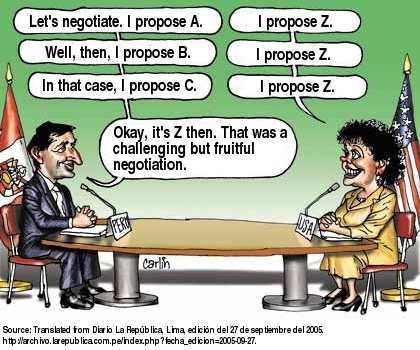
In May 2004, the US began negotiations with Colombia, Ecuador and Peru to reach some form of FTA with the three Andean countries — and later, if US plans worked out, Bolivia as well.
According to initial media reports, “There are three different scenarios under discussion about how to structure the free trade agreement with the US. The first would be one plurilateral agreement between the four countries. The second would be individual bilateral agreements between the US and each of the three Andean countries. The third would be an agreement between the three Andean Community of Nations (CAN) members, who have obligations within CAN, and the US. The US prefers the arrangement used in the CAFTA agreement, i.e. one plurilateral agreement among all parties. This option is not viable through CAN because not all CAN members are involved in this FTA process with the US. Therefore, according to the head of the Colombian delegation, what may emerge is a plurilateral agreement between the US and a special bloc comprising Colombia, Ecuador, and Peru.“
Since then, a number of special tensions have marked these FTA discussions. One is that the Andean countries have been reluctant to go beyond their WTO obligations in terms of intellectual property rights. The governments have kept expressing strong concerns about biodiversity, traditional knowledge, and access to medicines. Another overwhelming concern has been with regard to agriculture, where the Andean countries are reluctant to liberalize their markets on bilateral terms if the US will not agree to reduce domestic subsidies. An underlying concern has been how the FTA would interact with Andean Community law; that is, which of the two would take precedence.
Regarding the US side, Washington’s lack of flexibility has been pointed out by many as a hallmark of the process. For that reason, many people refuse to call these “negotiations“.
Indigenous peoples, farmers’ organizations, labour unions, and other social movements have been heavily mobilizing to stop this FTA. The FTA has been seen from the start as a thorough capitulation to US economic and geopolitical interests. In Colombia, Ecuador, and Peru, different sectors have pushed for national referenda on the FTA in their respective countries — and on several occasions organized their own.
In late September 2005, the US issued an ultimatum to sign an agreement by 20 November 2005 — before the 2006 electoral process in all three Andean countries and the mid-2007 expiry of Bush’s “fast track“ trade negotiating authority. No agreement was reached by end November, with Colombia and Ecuador holding back on several grounds and Peru saying it would proceed alone.
Since Peru signed a bilateral trade deal with the US in December 2005 and bilateral negotiations continuing with Colombia as of that date (until the US-Colombia deal came into force in March 2012), information on subsequent events is presented separately under US-Peru and US-Colombia.
As to Ecuador, Quito’s cancellation of a contract with Occidental Petroleum (Oxy) in May 2006 sounded the death knell for negotiations around a US-Ecuador FTA. With this decision, the government of Ecuador obeyed its law and the demands of the majority of Ecuadorans, who had been calling for an end to the negotiations and for Oxy’s departure.
last update: May 2012





